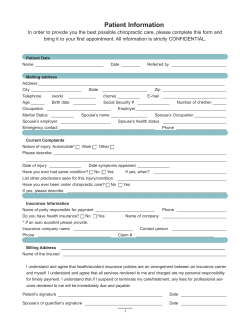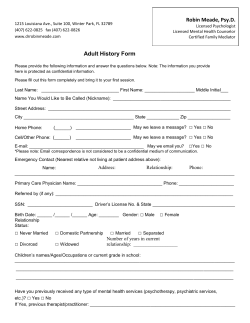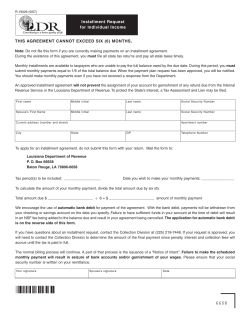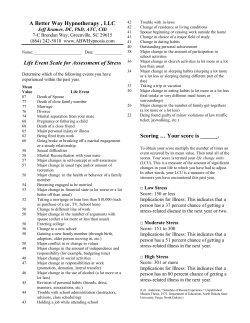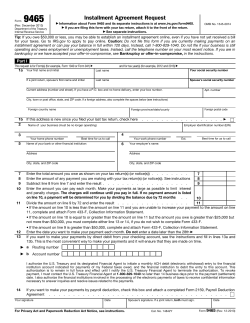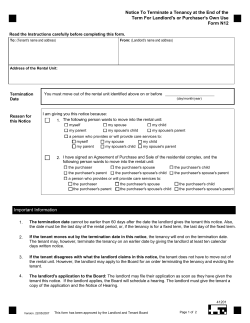
Living Together Community Legal Information Association of Prince Edward Island, Inc. Introduction
Community Legal Information Association of Prince Edward Island, Inc. Living Together Introduction Prince Edward Island, the definition of spouse includes same sex spouses, married spouses, and spouses who live together but are not legally married. According to the Domestic Relations Act, “spouse” is defined as: two people who are legally married or two people who have lived in a conjugal (sexual) relationship for 3 years or more or two people who are living in a conjugal (sexual) relationship and are the natural or adoptive parents of a child or children It is important to know that no amount of time together will change a common law relationship into a legal marriage. To be married, you must have a recognized marriage ceremony performed by a member of the clergy, a judge or someone who has been licensed to perform marriages in Prince Edward Island. Common law spouses have similar rights and obligations as married spouses for child support, child custody and access. The rights of common law spouses differ from married spouses in division of property. Rights and Responsibilities as a Common Law Couple Birth of Children Children born to unmarried parents have the same legal status as children born within a marriage. Parents have the same rights and responsibilities towards their children, whether they are married or not. Adoption Married or common law spouses can make a joint application for adoption. If you have a child, your spouse may be eligible to adopt as a step parent. You may need permission from the other biological parent of the child. 1 For more information and a complete list of adoption guidelines, contact Adoption Services 902-368-6511. Naming your Children Parents can choose to give their child: the last name of one parent a combination of the last names of the parents, in either order, or a completely different last name from either parent. The name you give your child does not change any rights or obligations each parent has toward the child. Cohabitation agreements One way you and your spouse can express rights and obligations towards each other is by signing a "cohabitation agreement". This can include such things as ownership of property, a division of property if separation occurs and support obligations towards each other. Custody and access rights to the children after separation and child support cannot be included in a cohabitation agreement. To be legally binding, a cohabitation agreement must be in writing and signed by you and your spouse and by a witness. It is best to have a lawyer write it for you. If you marry your spouse after signing a cohabitation agreement, the agreement is considered to be a marriage contract. Rights and Responsibilities after Separation Support for your spouse Spouses have a legal duty to financially support each other while they are living together. If the relationship breaks down and they separate or divorce, one person sometimes has to pay "spousal support" to the other. If you need support after separation, speak to a lawyer. Child custody and visiting rights Parents of a child, married or not, are joint custodians of their children while living together. Each has equal right to custody of the children if they decide to live apart. If parents need some help to make custody and access arrangements, they can use mediation, collaborative law, or counselling services. 2 If they cannot agree, Family Court can be asked to decide on the matter. The court will always consider the best interests of the children when deciding which parent will have the children living with him or her. The parent who does not have the children living with him or her almost always has the right to spend time with them and to be regularly informed about their health, education and welfare. Child support All parents are required to financially support their dependent children. This includes a parent who has never lived with the child. You may also have to pay support if you treated your spouse’s child as your own. The amount of child support to be paid by the parent who does not have the children living with him or her is calculated using the Child Support Guidelines. The guidelines are based on average amounts spent on raising children at the different income levels. To determine the amount of support to be paid, a number of factors are looked at, including the income of the person paying support, the number of children, and the province where the payor lives. You can get a copy of the Child Support Guideline tables and more information about child support from CLIA at 902-892-0853 or 1-800-240-9798. Property The Family Law Act is the law that deals with property of married persons. This includes the house, furniture, money, investments, and car. At the time of separation or divorce in a marriage, both spouses have the right to an equal division (one-half share) of these items. It doesn't matter who paid for an item or if only one name is on the deed or registration papers. This equal division law does not apply to common law spouses. When common law spouses separate, the person whose name is on the deed or receipt may be the only one entitled to it. Recently, the courts have been looking at the property of common law spouses more closely. If you have contributed time or money towards an asset owned by your spouse, or if you both intended the item to be jointly owned, the law may now help you to get a share of that asset after separation. If this is your situation, you need to see a lawyer. In order to avoid problems, it is important for common law spouses to own assets jointly, to keep accurate records and to keep receipts for purchases. A cohabitation agreement is an even better plan. A 3 cohabitation agreement is a legal document in which you express rights and obligations towards each other if you separate. Settlement of family law problems If you and your spouse separate, you may want to have a legal settlement of your affairs. You can try to reach agreement about child custody and access, about child support, about spousal support and about how to divide your property. To be legally binding, an agreement must be in writing, signed by you and your partner and witnessed. Each of you needs to get independent legal advice from a lawyer. If you cannot agree, you may ask the court to order a settlement. Other Rights and Responsibilities Estates It is important for you and your spouse to have wills to protect each other and to make plans for your children. If you do not have a valid will when you die, there are provincial laws which say what must happen to the things you own at your death (your "estate"). If you have no will, your estate will pass to your spouse and children. If you are dependent and your spouse dies without providing for you or the children, the court can order the estate to provide support for you. You must have been a dependant of the deceased for at least three years. This must be done quickly, so it is important to see a lawyer about this as soon as possible. Pensions Pension plans often pay "survivor benefits" to a spouse when the person who contributed to the plan has died. Some plans will give survivor benefits to a common law spouse. This depends on the pension. Government plans such as the Canada Pension Plan, Canadian Forces Superannuation, War Veteran's Allowances, and Old Age Security do recognize common law relationships, but only when certain requirements are met. The requirements of each plan vary and depend on factors such as the length of the relationship, and whether there is also a married spouse. Often a common law spouse must submit a special claim for benefits while a married spouse may be granted these benefits automatically. 4 Check the requirements of private and government pension plans carefully to see if your common law partner will be covered. Sometimes special forms need to be filled out or steps taken to prove the nature of the relationship while you are alive. Life Insurance You can benefit from a common law partner's life insurance policy only if you are specifically named as the beneficiary. Workers' Compensation Under the Worker's Compensation program, payments may be made to the surviving spouse and dependent children of a worker who has died from an employment-related injury. Taxation Canada Revenue Agency says a common law partner is a “spouse" if you have been living together for at least 12 months in a conjugal (sexual) relationship or if you have a child (or children) together. Check with Canada Revenue Agency for details. Legal Actions Although a married spouse generally cannot be forced to testify against his or her spouse in most criminal cases, a common law spouse can be required to testify. Under the Fatal Accidents Act, a spouse can sue a person who caused the death of their spouse in an accident. Your children can sue as well. Debts You are not responsible for your common law partner's debts unless you have co-signed for them or have signed a contract agreeing to pay for them. Other Benefits Many health and dental plans will cover a common law spouse and children. Check your plan for specific information. Social Assistance Members of a common law relationship will be considered one family if you apply for social assistance. The income and expenses of both partners will be assessed and benefits will be paid to the family as a unit, not as two single people. Human Rights The provincial Human Rights Act does not allow discrimination in employment, accommodations, lease or sale of property, 5 membership in professional, business or trade associations and employee organizations, publications, broadcasts, public displays, and advertisements, services and facilities available to the public, or volunteer work. This includes discrimination based on: age, association, colour, race, ethnic or national origin, creed or religion, criminal conviction (in employment), family status, marital status, physical and intellectual disability, political belief, sex or gender, sexual orientation, source of income, or having filed a complaint or given evidence or assistance under the PEI Human Rights Act. Your rights in these areas cannot be legally denied. If you feel you have received different treatment because you are in a common law relationship, contact the Human Rights Commission. Its toll-free number is 1-800-237-5031. The Canadian Charter of Rights and Freedoms also forbids discrimination in laws and government actions. Although discrimination because of marital status is not specifically mentioned, most experts feel this is covered by the Charter. This pamphlet was published by Community Legal Information Association of Prince Edward Island Inc (CLIA). It contains general information about the law. It does not contain a complete statement of the law in this area and is not a substitute for legal advice. If you need legal advice, contact a lawyer. If you do not know a lawyer, call the Lawyer Referral Service (902-892-0853 or 1-800-240-9798). You can have a brief consultation for a small fee. Community Legal Information Association of PEI, Inc. (CLIA) is a charitable organization that receives funding from the Department of Justice Canada, the PEI Department of Environment, Labour and Justice, the Law Foundation of PEI and other sources. CLIA provides 6 Islanders with understandable and useful information about our laws and the justice system. For more information, you can telephone CLIA at 902-892-0853 or 1-800-240-9798, visit our website at www.cliapei.ca or email us at clia@cliapei.ca . You can also find us at: www.facebook.com/CLIAPEI, www.twitter.com/CLIAPEI and www.youtube.com/CLIAPEI. Non-commercial reproduction of this document is encouraged. Charitable registration number: 118870757RR0001 ISBN 978-1-897436-11-0 Published June 2008 Revised January 2010 7
© Copyright 2025
